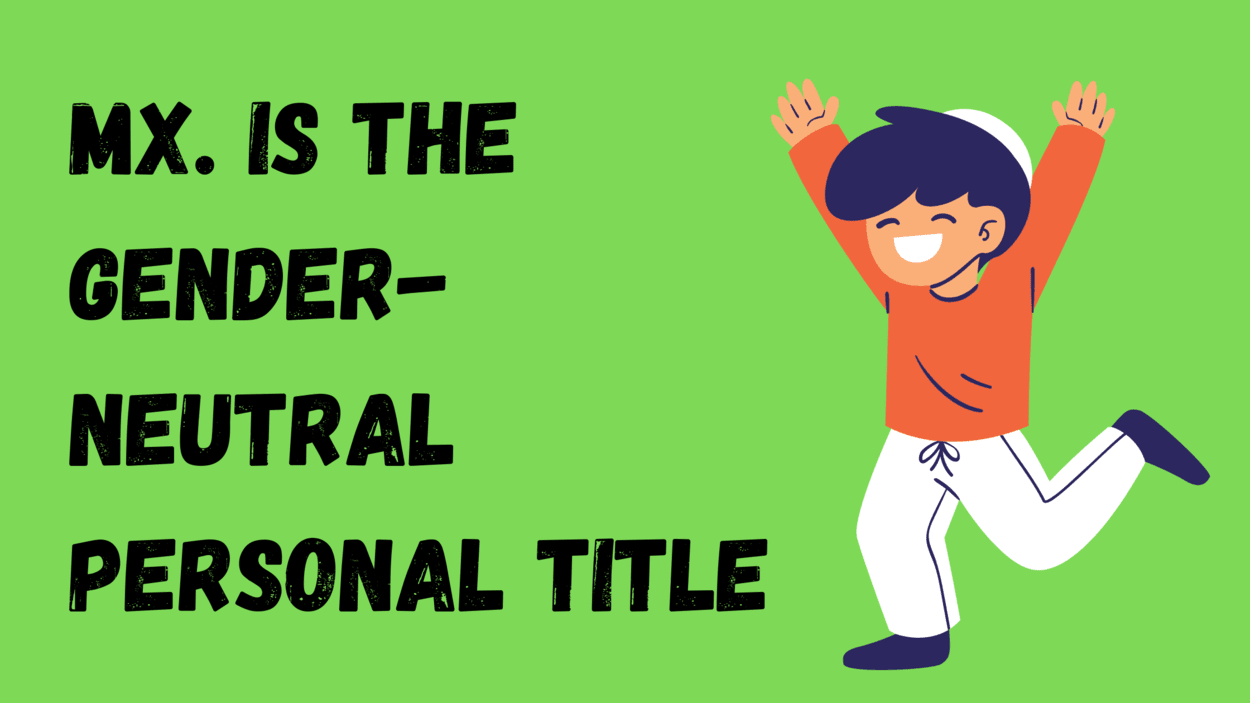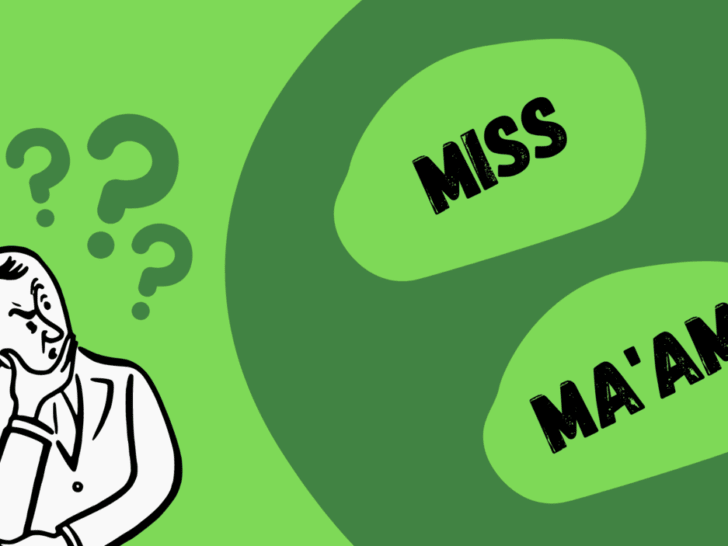“She is my wonderful friend, Jose.” Something’s wrong with the sentence. Well, that’s the same case when you improperly use Miss or ma’am. And aside from making a mistake, you might even offend someone.
Don’t worry, though. You’ll know which one to use once you finish this article.
Besides knowing the difference between Miss and ma’am, you’ll also end up knowledgeable about their etymology and the importance of choosing words carefully.
I’ve answered most of your common questions about Miss and ma’am below. All you need to do is read curiously.
What’s the Difference Between Miss and Ma’am?
Opt with Miss when talking with a young or unmarried woman. It’s capitalized and can be used alone — without needing a name afterward. For example, “Hi, Miss. Here’s the gift I promised you.”
However, Ma’am is age-neutral and implies politely talking with an older woman. Ma’am is used in isolation, but unlike Miss, ma’am can be uncapitalized. Use it to address someone formally like, “Good Morning, ma’am. Would you like to have a cup of coffee or tea?”
More Examples of Miss and Ma’am in a Sentence
To understand a particular topic, you need more practical examples. So here are additional sentences that use Miss and Ma’am:
Using Miss in Sentences
- Miss Angela, thank you so much for helping me out a while ago.
- Excuse me, Miss. I think there’s something wrong with this paper.
- What will we do today if Miss Jennifer is absent?
- This notebook belongs to Miss Frances Smith
- Please give this letter to Miss Brenda Johnson later
Using Ma’am in Sentences
- Good morning, ma’am. What can I do for you today?
- Ma’am, your meeting is about to start in an hour.
- You have to rest, ma’am.
- I tried my best, but ma’am said the due date will still be tomorrow.
- It’s nice to talk with you, ma’am.
Why Is It Important to Know Miss and Ma’am‘s Difference?
It’s essential since both Miss and ma’am have different uses. Moreover, knowing their difference explains why some women don’t prefer being called ma’am. This contrast begets the importance of choosing words carefully.
Words communicate feelings. Use the right words to have effective communication. But if you use the wrong ones, it’ll arise negative emotions.
You already know why choosing words carefully are essential. You must now deal with another question: How can I choose words carefully?
Three Tips to Choose Words Carefully
Synonyms are a great way to choose your words. Apply them correctly, and you’ll have better conversations. However, there are other things you should consider before choosing your words. Improve your word choice by following these three tips:
1. Think before you speak (or write). Ask yourself a few questions like, “Would saying ma’am offend her?” By doing this, you anticipate unintentional mistakes.
2. Understand the meaning behind a word. To understand the origin (etymology) of a word means you also understand the idea it implies. Simply searching Miss and Ma’am’s etymology will help you have a clearer understanding of their difference — but I made this easier for you by explaining both Miss and ma’am’s etymology later.
3. Acknowledge the feelings of others. This recognition connects to thinking before speaking. If you know that the woman you’re talking with hates feeling old, then it’s best to not refer to her as ma’am.
Etymology of Miss and Ma’am
Miss, along with Mrs., originates from the root word mistress. It has multiple meanings before and often referred to a woman with authority. However, the word mistress is now used to negatively connote a woman’s relationship with a married man.
On the other hand, Ma’am is a contraction originating from the word madam — Madame, which means “my lady” in Old French. There came a time when madam was only used for queens and royal princesses. Servants also used it before to address their mistresses. Henceforth, ma’am is a general term for younger people to convey reverence towards older women in this day and age.
When Should You Use Miss and Ma’am?
Use Miss to refer a younger woman and ma’am to indicate a woman who’s either older or higher in rank. However, some women don’t like being referred to as ma’am. This referral may put them in a bad mood, be careful.
Is It Rude to Call Someone Ma’am? (edit)
It’s not rude to call someone ma’am, but it does offend certain women. The reason behind this may differ from person to person. However, the most common one is it makes them feel older.
Ask women how they want to be addressed since asking prevents offending them. Alternatively, calling them as Ms. or Mrs. is a safe option too.
What Are Personal Titles?
A personal title is used to indicate someone’s gender and relationship status. They’re often placed before stating a name. Other than “miss” and “ma’am,” the table below shows commonly used English personal titles:
| Personal Title | When Is It Used? |
| Ms. | Addressing an older female formally, along with her surname, and when you’re not sure if she’s either married or not. |
| Mrs. | Referring to a married woman |
| Mr. | Communicating with either a married or unmarried man |
Watch this video to know more about when to use the duplicate personal titles stated above:
Are Personal Titles and Honorifics the Same?
Individual titles and honorifics are the same. However, personal titles tend to suggest a marital status, while honorifics imply particular professions such as:
- Dr.
- Eng.
- Atty.
- Jr.
- Coach
- Captain
- Professor
- Sir

Is There a Gender-Neutral Personal Title?
Mx. is a personal title without any gender. It’s dedicated to those who don’t want to be identified by gender. The earliest evidence of using Mx. dates to 1977, but dictionaries only added it recently.
An exciting benefit of using Mx. is removing gender expectations.
“When people see ‘Mr. Tobia’ on a nametag, they’re expecting a masculine man to walk through the door; however, when the nametag says, “Mx. Tobia,” they have to put their expectations aside and simply respect me for who I am.
Jacob Tobia
Final Thoughts
Use Miss when talking with a young woman, but choose ma’am for the elderly. Although you must be careful in selecting words like ma’am, it may offend some women. It’s safe to think first and determine if the woman you’re talking with doesn’t like feeling old.
Both unique titles may be used in solitude, but their capitalization differs — Miss is capitalized, while ma’am isn’t. Also, keep in mind that personal titles and honorifics are the same. It’s just that honorifics are used more to indicate professions than marital status.
Miss and Mrs.’s etymology is mistress, which means “a woman in authority.” However, mistress is now used to hint at a woman having a relationship with a married man. Meanwhile, the origin word of ma’am is a contraction for madam or madame in Old France that means “my lady.”
Other Articles:
- Is “Walk past” the same as “Walk pass”? (Grammatically correct)
- Is there any difference between “How are you holding up” and “How are you doing” or are they the same? (grammatically correct)
- What is the difference between “está” and “esta” or “esté” and “este”? (Spanish grammar)
The web story and more concise version of this article can be found here.

